Me and My Twitter: Our Untold Love Story
This week I taught the film Wall*E (2008, Andrew Stanton ) in my Film Theory and Criticism course. I selected the film to complement the week’s topic on digital cinema. However, my students were far more interested in discussing the film’s post-apocalyptic vision of an Earth so overrun with consumer waste that it must be abandoned for a clean, automated, and digitized existence on the Axiom, a spaceship that caters to humankind’s every need. Robots take care of human locomotion (which is why these humans are no longer able to walk), food (lunch in a cup!), grooming (robot manicurists!) , and even decision-making:
My students were critical of these human characters: for their sloth, their apathy, and most importantly, because of their inability to form real human connections. “They only communicate with each other through screens!” they lamented. I then pointed out that the behaviors of the humans on the Axiom are not too different from the behaviors of the humans on our college campus. As I walk to and from my office I see students, heads bent, eyes averted, typing away on their smart phones. Those who aren’t typing on their phones are talking on their cell phones or listening to their I Pods. Eyes plugged, ears plugged, the students I see each day rarely commune with the real world around them. Like the humans on the Axiom, we are surrounded by screens and by virtual relationships. This realization seemed to depress my students.

But I’m not all that saddened by this vision of the future. No, I don’t want to become a rotund, infant-like drone, sucking my lunch out of a cup, but I am quite fond of the connectivity fostered by the internet and the proliferation of increasingly more affordable smart phones. In particular, I love Twitter. Man, do I love Twitter.
When I first joined Twitter in March 2009, I found it to be a lonely place. Gone were the hundreds of friendships I had accumulated on Facebook. Gone were those cute pictures of people’s babies and dogs (no really, I like seeing those). Gone was the instant validation I received when friends commented on my witty and hilarious status updates with their witty and hilarious rebuttals. Instead, I was faced with a long lists of 140 character statements, typed up by strangers, and addressed to no one in particular.

But over time I grew to understand the role of Twitter in my life. As many people have pointed out, Facebook is for connecting with the people I already know. Twitter, however, is for connecting with the people I would like to know. Sound creepy? Sure it does. But really it makes a lot of sense.
In my profession (higher education), networking with colleagues is key. In the past, such networking took place mostly at academic conferences. For example, imagine you are the editor of a film studies journal and you hear someone deliver a paper that sounds perfect for your next issue. You might approach the speaker at the end of the panel and ask her if she’d consider submitting her conference paper for publication in your journal. Or imagine you’re a graduate student and you need to find a scholar outside of your university to serve as a reader of your dissertation. You can approach one of your academic heroes at the bar later that evening, introduce yourself, and pop the question.
Yes, that’s all fine and good for the extroverts among us. But me, I’m an introvert. Or rather, I am the worst kind of introvert — an extroverted introvert. In other words, I love to socialize and meet new people, but I hate being the one who initiates the socializing and I hate introducing myself to new people. I don’t make a great first impression, but I make an excellent third impression. So up until the advent of Twitter, I was not able to meet many new people or forge important professional connections when I attended conferences. Instead, I mostly hung out with my (admittedly awesome) friends from graduate school, getting very drunk in the hotel bar.

But all of this has changed because of Twitter. Not only has it allowed me to meet with loads of new and interesting film and media scholars at conferences, it has also allowed me to develop professional relationships with people I have yet to meet. Many of the people I follow on Twitter also teach film and media studies courses and, even though we have not personally met, are more than willing to offer advice. For example, I am currently developing a syllabus for a new course, American and International Film History (1945 to the Present) and was having a hard time selecting a film for my week on New Hollywood Cinema. What to choose? So, I posed to the question to the Twitterverse:
And here are some of the responses I received:
This kind of conversation is especially important for someone like me, who teaches at a university in which there are only a few film studies scholars (there are three of us to be exact). Twitter provides me with an opportunity to brainstorm syllabus ideas, to get research suggestions for upcoming projects, and even to receive feedback on works in progress (via this blog) with an unlimited, virtual community of colleagues. It’s pretty amazing when you think about it.
Another thing that I love about Twitter is that it assembles an ever-present virtual community who is willing to listen, or at least bear witness to, my daily grievances. Here’s a post from a few weeks ago:
There is nothing profound about this tweet. In fact, it’s the kind of banal statement that most people would cite as evidence of Twitter’s utter pointlessness. But when I wrote this, I was having a bad day. And the shoes that I had to wear during my long walk home in the rain were destroyed. So it felt good to send my annoyance out there into the Twitterverse. Even if no one read it, the Tweet exists, and that’s enough for me.
Twitter is also great for someone in my profession because much of my work is completed in solitude. Yes, I teach in front of large groups of students and yes I have to attend committee and department meetings, but by and large I work alone. Therefore, Twitter affords me the opportunity to drop in and out of ongoing conversations, to comment on someone else’s tweet, to read a recommended article, or to watch a clip of someone crying about a “double rainbow,” when the mood strikes.A few minutes here, a few minutes there. It’s just the break I need in order to remain productive and, oddly enough, focused on the task at hand. Twitter is like a virtual coffee house filled with hundreds of interesting, funny, and bizarre individuals, who can be tuned in or tuned out throughout the course of the day.
It’s true, Twitter has caused me to share more banal details about my life than Facebook ever did:
And no one really needed to know that my cat doesn’t clean his ass after he uses the litter box:
Nevertheless, Twitter has added real value to my life. When I got my very own smart phone almost two months ago, I joined the other screen-entranced zombies who shamble across the ECU campus. But it’s not so much that I’m tuning the real world out. I like to think that I’m bringing more of the world in.
If you’re interested in reading more about the impact of being “plugged in,” you may be interested in the much-discussed (at least in the Twitterverse) article by Virginia Heffernen, “The Attention-Span Myth,” as well as Michael Newman’s thoughts on her piece. Both were written with more time and care than this blog post. But that’s because I’m too busy tweeting, ya’ll.

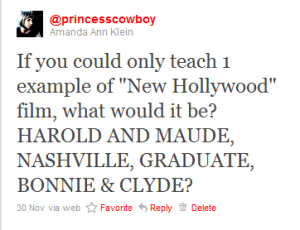
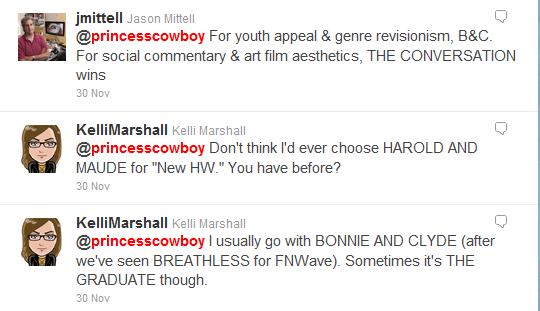
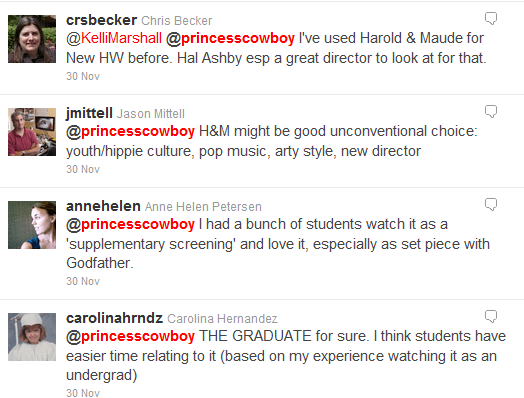
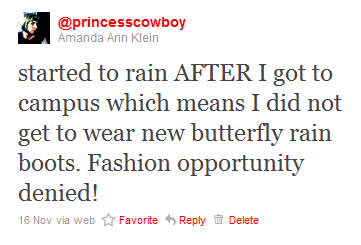
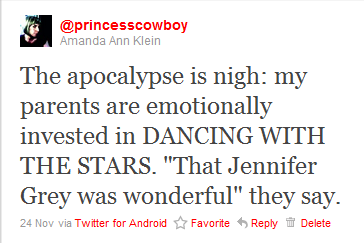
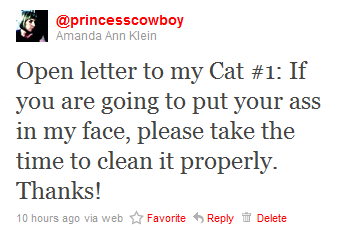
December 3, 2010 at 10:14 am
Well put, A. You’ve made a convert of me for these very reasons!
December 3, 2010 at 10:39 am
Nice article. I laughed out loud at the pic of “u” at ur first convention. Awesome.
December 3, 2010 at 10:43 am
Thanks! I’ve grown my hair out since then, which makes me look more feminine. But I still can’t cover up that Adam’s apple.
December 3, 2010 at 11:27 am
Love! And I was so glad to have met you on Twitter and then in “real life” at that conference in PA.
December 3, 2010 at 4:01 pm
[…] written before on ProfHacker about why you might want to try Twitter, and Amanda Ann Klein’s excellent blog post illustrates just this point, in part by reproducing actual Twitter conversations: Twitter provides me with an opportunity to […]
December 3, 2010 at 5:58 pm
Objection!!! This is NOT the Amanda that I know: “I love to socialize and meet new people, but I hate being the one who initiates the socializing and I hate introducing myself to new people. I don’t make a great first impression, but I make an excellent third impression.”
You’re crazy. If you’re not an extrovert, I don’t know who is. And you make a better first impression than anyone I know! Anyone I’ve introduced you to for the first time has always been won over instantly.
December 3, 2010 at 7:56 pm
You flatterer, you! Like I said, I believe I am an extroverted introvert because I really do love socializing but I find it difficult to approach people I don’t know, especially in a professional context. And hanging out with you, an extroverted extrovert, makes it a little easier of course!
February 10, 2011 at 4:48 pm
[…] Today all it take is one tweet to capture the ear of your favorite celebrity. Or, to paraphrase Amanda Ann Klein, Facebook is for connecting with you already know; Twitter is for connecting with people […]
October 2, 2011 at 10:15 pm
Isn’t it about time that the men of the world won a fashion day out… lets be honest we need it more and most of us love a bit of shopping on the sly, sssshhhh dont tell anyone though.
April 2, 2012 at 10:06 am
[…] Don’t know where to start on Twitter? Follow me! No really, FOLLOW ME. My Twitter handle is @princesscowboy. Want more people to follow? Check out the the super “interactive web of Tweeters” on the SCMS website and follow the people whose handles are listed there — they are all active Tweeters, or at least they were during SCMS. For a more detailed account of my Twitter love, read my previous post on the subject. […]
December 20, 2012 at 3:31 pm
[…] information on syllabus building as well as my own personal research (I have detailed why here), the 140 character limit can be, well, limiting when trying to get an answer to a question that is […]